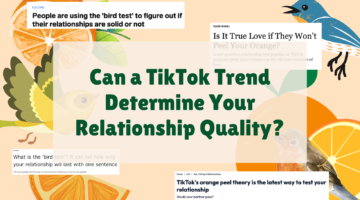Has Online Dating Made Our Relationships Better?
April 2, 2012 by Justin Lehmiller
A group of psychologists recently published a paper in which they critically examined the science behind online dating in order to answer two questions: How is online dating different from traditional (i.e., offline) dating? And are couples who meet online better off in the long run [1]? Their analysis suggests that online dating is definitely a unique way of starting relationships and has some distinct advantages over other ways of meeting people; however, it is also subject to some major limitations that ultimately prevent it from creating perfect relationships for everyone. In this article, I review some of the major points raised by the authors of this fascinating paper.
With respect to the first question (i.e., how online dating is unique), one of the main differences is that the process of online dating allows you the opportunity to learn vast amounts of information about another person before you decide whether you want to meet them in real life, as opposed to meeting someone first and then learning about them in installments. Another major difference is that online daters are increasingly opting to be matched with a partner via a computer program, rather than seeking input from friends and family regarding who is likely to be a compatible partner. Online dating thus completely changes the way we have traditionally made love connections.
As for the bigger question of whether online dating is a better way to start a relationship, the answer to that question is mixed. On the positive side, online dating offers access to a much larger and more diverse pool of potential partners than you can get anywhere else, which may be especially appealing to gay, lesbian, and bisexual individuals, who may face more challenges finding love in person than their heterosexual counterparts. Online dating also allows for an easy screening process, whereby you can efficiently eliminate from consideration people who possess traits you would consider to be romantic deal-breakers (e.g., having the “wrong” political beliefs). This can be accomplished by setting appropriate search filters, or through a brief exchange of online messages.
In terms of disadvantages, online dating has a tendency to reduce people to their profiles, and this does not necessarily give you an accurate indication of what a real-life interaction with that person might be like. Indeed, the things people find appealing about an online profile are not necessarily the same things that people find appealing about someone they meet in person [2]. In other words, what sounds good “on paper” may not necessarily be as enticing in reality. Online daters may thus be unknowingly emphasizing the wrong things in their quest for love. In addition, having access to such a large number of potential partners is both a blessing and a curse. While it’s nice to have more options, too many options can make it difficult to choose and people may end up making poor decisions.
Lastly, we do not have any solid evidence that the matching programs used by the most popular online dating sites (e.g., the “29 Dimensions of Compatibility”) are actually superior to more traditional ways of starting relationships. The problem seems to be that the main thing online dating sites do is match couples based on similarity. While it’s true that, by and large, people tend to choose partners who are similar to them in many ways (in terms of age, religion, attitudes, etc.), research has found that the effect of similarity on relationship success is typically rather small. Thus, although similarity may be a good starting point for a relationship and is important for initial attraction, similarity alone is not a sufficient condition for creating everlasting love. As some evidence of this, research indicates that couples who meet online don’t necessarily stay together any longer than couples who meet offline [3].
In short, online dating has profoundly altered the way we meet romantic and sexual partners these days; however, despite the frequent success claims made by internet dating sites, it has not necessarily made our relationships better.
Want to learn more about Sex and Psychology? Click here for more from the blog or here to listen to the podcast. Follow Sex and Psychology on Facebook, Twitter (@JustinLehmiller), or Reddit to receive updates. You can also follow Dr. Lehmiller on YouTube and Instagram.
[1] Finkel, E. J., Eastwick, P. W., Karney, B. R., Reis, H. T., & Sprecher, S. (2012). Online dating: A critical analysis from the perspective of psychological science. Psychological Science in the Public Interest, 13, 3-66. doi:10.1177/1529100612436522
[2] Eastwick, P. W., Finkel, E. J., & Eagly, A. H. (2011). When and why do ideal partner preferences affect the process of initiating and maintaining romantic relationships? Journal of Personality and Social Psychology, 101, 1012–1032. doi: 10.1037/a0024062
[3] Rosenfeld, M. J., & Thomas, R. J. (in press). Searching for a mate: The rise of the internet as a social intermediary.American Sociological Review.
Image Source: 123rf
You Might Also Like:

Dr. Justin Lehmiller
Founder & Owner of Sex and PsychologyDr. Justin Lehmiller is a social psychologist and Research Fellow at The Kinsey Institute. He runs the Sex and Psychology blog and podcast and is author of the popular book Tell Me What You Want. Dr. Lehmiller is an award-winning educator, and a prolific researcher who has published more than 50 academic works.
Read full bio >


